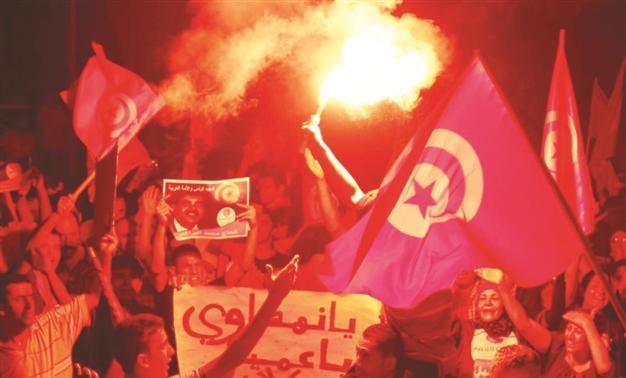Islamist militants exploiting Libya chaos, says Tunisia PM
TUNIS - Reuters

Anti-government protesters hold flares and shout slogans during a demonstration in Tunis in this August photo. Ennahda has agreed that the government it leads will step down after three weeks of talks that start on Oct. 23.
Tunisia’s Prime Minister Ali Larayedh said Islamist militants are exploiting anarchy in neighboring Libya to get training and smuggle weapons across North Africa’s porous borders.
His coalition government is grappling with an Islamist militant group known as Ansar al-Sharia, which is one of the most radical to emerge since Tunisia’s 2011 uprising against autocratic President Zine al-Abidine Ben Ali Ben Ali.
Security is a sensitive matter for Larayedh’s ruling moderate Islamist party, Ennahda, which has agreed to step down in three weeks to end months of unrest set off by the assassination of two secular leaders by Islamist militants. As well as Ansar al-Sharia, North Africa is home to al-Qaeda in the Islamic Maghreb and other Islamist militants such as those led by veteran commander Mokhtar Belmokhtar, who claimed responsibility for the attack on Algeria’s Amenas gas plant in January, in which nearly 40 foreign workers were killed.
France’s military campaign to oust al-Qaeda-linked Islamist fighters from Mali this year prompted some to enter southern Libya, where the government in Tripoli exerts scant control.
“There is a relation between leaders of Ansar al-Sharia, al-Qaeda in the Islamic Maghreb and Ansar al-Sharia in Libya. We are coordinating with our neighbors over that,” Larayedh, who was interior minister before becoming premier, told Reuters.
“Extremists in Tunisia have profited from the situation in Libya and they get their weapons from Libya. They have benefited and they have gotten training in Libya.” Tunisia, where a series of Arab uprisings began in 2011, had been seen as a regional model, and its transition to democracy remains less violent than those in Egypt and Libya. But Islamists, who were long oppressed under Ben Ali, have gained influence, fuelling debate about the role of political Islam.
Salafi Islamists have prevented concerts and plays being staged in some cities, and attacked alcohol vendors, saying they violated Islamic principles. For secular Tunisians, Islamists want to impose strict Sharia or Islamic law, which they feel threatens liberal education and women’s rights. Ennahda itself is split between conservatives and moderates. The party won 40 percent in Tunisia’s first post-revolt election for an assembly to draft a new constitution. It formed an interim coalition government with two secular parties.
Transition beginsBut the political transition was knocked off track by the assassination of the two opposition leaders, which enraged those who believed Ennahda was too lenient on Salafi Islamists blamed for those killings and other attacks on secular Tunisians.
Now Ennahda has agreed that the government it leads will step down after three weeks of talks that start tomorrow to form a caretaker government, set up an electoral commission and decide on a date for elections to put the country back on track. “This is a not a loss, more a part of the transition,” Larayedh said of the government’s resignation. “What our country needs is stability.”
Libyan PM says he's swimming against the current in chaos
TRIPOLI - The Associated Press
Libya’s prime minister said Oct. 20 he is “swimming against the current” in a country awash with militias and weapons as Libyans mark the second anniversary of the killing of Moammar Gadhafi.
Ali Zidan spoke to journalists in Tripoli, more than a week after he was seized and briefly held captive by a mix of militiamen. Over the past two years, rebels grew from tens of thousands to nearly 200,000 militiamen, acting with impunity, and turning Libya’s cities and districts to fiefdoms. The government is “swimming against the current and this is very hard,” Zidan said.
He identified lawmakers Mohammed al-Kilani and Mustafa al-Teriki as being the ones who plotted his abduction. The two lawmakers, belonging to Libya’s hard-line Islamist bloc in Parliament, later spoke journalists, with one saying Zidan was a “liar” who wanted to emerge from the crisis as a “hero.” Zidan also blamed “various parties” for hindering the establishment of an effective military and police force, naming only retired army officers as slowing down the process. He also said there are “people who want to hijack the state,” in reference to the country’s many militias. In a statement carried by Libya’s official LANA news agency, the Cabinet said the country is facing “mounting security challenges in the spread of weapons.” This summer, armed militias besieged ministries to press Parliament to pass a divisive law known as the Political Isolation law, which bans senior Gadhafi-era officials from politics.
